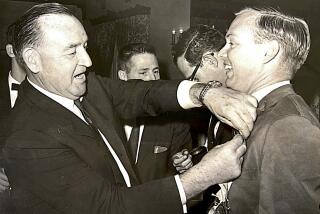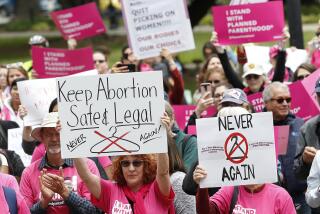Florida Recount Disaster Couldn’t Happen Here
SACRAMENTO — California’s superiority to Florida long has been obvious. Our citrus is larger and tastier. Their summer beaches are miserably muggy. Now we’ve also seen Florida’s pathetic vote counting.
And it’s no contest.
That Florida circus could never play here.
For starters, our local election officials aren’t partisan political hacks. We can thank some oft-maligned progressive do-gooders from a century ago, who insisted that all local elected offices be nonpartisan. In fact, most local election officials aren’t even elected; they’re appointed by boards of supervisors.
Consequently, our election managers are efficient, faceless bureaucrats--not finger-in-the-wind pols seeking TV face time.
“Most of the nation’s local election officials are partisan,” notes L.A. County Registrar-Recorder Conny McCormack. “That’s always seemed like a huge conflict of interest to me.”
But anything can be improved and California should take the next big step: Make its chief election officer--the secretary of state--a nonpartisan official. Independently elected, but politically nonaligned.
Currently, the only nonpartisan statewide official is superintendent of public instruction. And you can make a better case for freeing the election overseer from party pressures.
Just look at Florida and Republican Katherine Harris--citrus heiress, campaign mudslinger, secretary of state and state campaign co-chair for George W. Bush.
“When Katherine Harris has exercised her discretion, it always has favored Bush,” points out California GOP analyst Tony Quinn. “You can’t have confidence in a partisan in that office. Frankly, California should have a nonpartisan secretary of state.”
Democratic political reformer Tony Miller agrees. A former acting secretary of state, Miller asserts: “Having the chief of elections be a partisan officer is like having a baseball player serve as the umpire when his team is playing.”
*
*
He won’t get any argument from California Secretary of State Bill Jones, a Republican who long has advocated making his job nonpartisan. Twice Jones has pushed such legislation and watched it be killed by Democrats, who these days prosper from partisan politics in this state.
Unlike Harris in Florida, however, Jones has never been accused of using his office to help party pals. Florida-like chaos is unlikely to occur here anyway.
Some reasons:
* No bewildering butterfly ballots. In California, they’re an extinct species.
* One statewide standard for chads. Only hanging chads are counted. They must be dangling from at least two corners. Dimpled chads--pregnant chads--forget it. Those ballots are discarded. In Florida, by contrast, each local election board dreams up its own chad rules. It’s what you’d expect from a state that can’t even settle on one time zone.
* All absentee ballots must be in hand by poll-closing on election night. They’re not allowed to drift in for days from across the ocean.
* Local election officials have 28 days to count ballots and certify results. Then--and only then--can somebody ask for a recount. And when a recount is requested, it must be conducted--if the requester is willing to foot the bill. There can’t be any whiny refusals--We just don’t have enough time--as in Miami-Dade County.
“I found that kind of odd,” says Alameda County Registrar Brad Clark, president of the California Assn. of Clerks and Election Officials. “In California, you couldn’t possibly do that.”
*
*
California has had several very close presidential elections, but none apparently has prompted a recount, according to state Librarian Kevin Starr. The only time “California was sort of the Florida,” he notes, was 1916.
Republican nominee Charles Evans Hughes went to bed election night thinking he was the next president. But overnight, California gave the election to President Woodrow Wilson. The Democrat carried the state by 3,420 votes, a margin of only 0.3%.
Starr recalls the famous story: “A reporter called to tell Hughes. An aide said, ‘The president-elect is still sleeping.’ ‘Well, tell him when he wakes up that he’s no longer the president-elect.’ ”
These days, befitting its technological preeminence, California is moving toward computer touch-screen voting. On Nov. 7, Riverside became the nation’s first county to use these devices in all its polling places. They were fast and fail-safe, reports Riverside Registrar Mischelle Townsend.
The issue is fairness--not for politicians or parties. It’s about citizens having a fair chance to vote for the candidate of their choice. And it’s a lot more fair for voters in California than in that swamp state.
More to Read
Get the L.A. Times Politics newsletter
Deeply reported insights into legislation, politics and policy from Sacramento, Washington and beyond. In your inbox three times per week.
You may occasionally receive promotional content from the Los Angeles Times.











